 Saya's Honors Portfolio Saya's Honors Portfolio  http://sayamadeaportfolio.neocities.org http://sayamadeaportfolio.neocities.org 
|
.png)
 Embracing Discomfort
Embracing Discomfort Volunteering for WashPIRG (WI22)
Volunteering for WashPIRG (WI22)
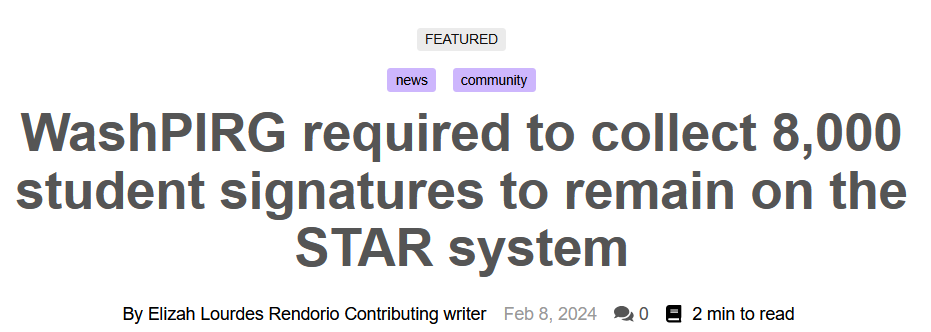 My involvement with WashPIRG began when one of their employees came into my freshman year ASTR 101 class and gave a brief talk about the work that they do. At the end, they passed around a contact sheet for anyone interested in volunteering, which I eagerly signed myself up for. I had enjoyed volunteering in high school, and thought that it would be nice to get involved in college too.
My involvement with WashPIRG began when one of their employees came into my freshman year ASTR 101 class and gave a brief talk about the work that they do. At the end, they passed around a contact sheet for anyone interested in volunteering, which I eagerly signed myself up for. I had enjoyed volunteering in high school, and thought that it would be nice to get involved in college too.
The volunteering opportunity involved collecting signatures from students so that WashPIRG could continue to ask for donations on the pre-registration page. This was a far cry from any of my previous volunteer experiences. Whereas in high school I had volunteered mostly at food banks sorting and packing donations, or helping set up and tear down various community events, this was much more public facing. I had to cold approach people, and as I'm sure you can imagine, not everyone took kindly to this. I was brusquely brushed off or ignored by most. A few people snapped at me, clearly irritated. Miserable but feeling obligated to see through what I signed up for, I continued to approach people for my allotted time and not a minute more. As soon as I was done, I handed back my clipboard and went back to my dorm. There, I locked myself in the bathroom and finally let loose the tears I had been holding back all afternoon. It was, overall, such an awful experience that I couldn't bring myself to sign up for it again. But now that enough time has passed, I can say that I'm glad I tried it once. This experience gave me a new appreciation for how difficult activism is, a lesson I would have had to learn at some point as I got more involved in AI ethics.  PUP Concert (SP22)
PUP Concert (SP22) One of the many things that the pandemic brought to a halt was the live music scene. By the spring of 2022, I hadn't been to a concert in over two years–the last time being when I saw PUP, one of my favorite bands, at the Neptune Theater for my 17th birthday. So when I saw that they were returning to Seattle for the first time since then, my immediate thought was that I had to go see them again. However, I also had some reservations. By this point, I was completely unused to being in crowds, and I felt uncomfortable being in an unfamiliar place with people I didn't know. Though public gatherings of all sizes had resumed several months before, I still avoided them due to my feelings of social anxiety. On top of that, none of my friends were able to go with me, which made me worry about my safety. I went back and forth on my decision, but ultimately I decided that I needed to go to this show. I owed it to myself, and I owed it to the 17 year old that I had been before the isolation and stress of the past two years. On the night of the show, I nervously entered the venue, not sure what to expect. What greeted me was an unexpectedly quiet crowd. The other concertgoers were scattered around the room, nursing drinks and chatting to one another. This calm atmosphere disappeared immediately when PUP came on stage and began playing. People cheered and yelled, many rushing to the area right in front of the stage and starting a mosh pit. I stayed by the edge of the crowd at first, but by the third song I worked up the nerve to join in. I remembered from the show two years ago how cathartic it was to be in the pit, jumping around and screaming and shoving up against other people. Once in the pit, all of my doubts and worries about coming to the show alone dissipated. I was struck by what a wonderful community I had become a part of, where we could all let loose together. At one point, I lost my balance and fell, but I was being helped up before I even had the time to be afraid. When someone in the crowd lost their phone, everyone worked together to look for it, using our phone flashlights to search the floor until it was found. Towards the end of the show, someone next to me asked if I wanted to crowdsurf. Hesitantly, I agreed, and he lifted me up. Without even being asked, the people around us took my weight, lifting me above their heads and passing me towards the barricade. Anyone who frequents punk shows knows that the most important thing during a show is looking after each other. This was something that I felt keenly that night. Despite not knowing anyone in the crowd, I felt completely safe. There, in the sweaty, loud, venue, I had a kind of epiphany. The past few years had been traumatic for everyone, and there were going to be plenty of bad things ahead of us too–but we would get through them as a community. This is a realization that I could never have come to if I continued to isolate myself and avoid other people as I had gotten used to doing over the pandemic.  Honors 222B: Artificial Intelligence Meets Society (SP22)
Honors 222B: Artificial Intelligence Meets Society (SP22)In this course, as you can probably tell from the title, we learned less about the science underpinning AI technologies and more about its social impacts. What I hadn't expected was that these impacts were disproportionately negative. We talked about environmental damage, labor exploitation, and the perpetuation of racial bias–all a result of emerging AI technologies. For one of my assignments, I wrote a short essay responding to the question of whether the Seattle Police Department should be permitted to use facial recognition technology. My response argued for using this technology with strict restrictions, drawing evidence from the biased performance of facial recognition technology and referencing SPD's history of discrimination. This class forced me to confront the fact that the tech that I marveled at makes the world a less safe place for many. The people that benefit from AI and the larger tech industry are those that are already protected and privileged by existing systems of power–people like me. Those that fall outside of this bubble bear the brunt of AI's negative impact. I couldn't think of anything worse than my work unintentionally hurting people. Thankfully, in addition to opening my eyes to the dangers and pitfalls of AI, this class also introduced me to work that was being done to fight against bias, exploitation, and the invasion of privacy caused by AI (a very cool example of this is the Algorithmic Justice League, founded by Dr. Joy Buolamwini!). This was what initially sparked my interest in AI ethics. Through engaging with ideas that challenged my own views, I was able to gain a more nuanced understanding of the world and my place in it. Specifically, I now know that, should I work in the tech industry, I want to pursue work that engages with social issues and uses technology to improve the lives of all people–not just the ones in power.  Community Council (AU22 - SP23)
Community Council (AU22 - SP23)
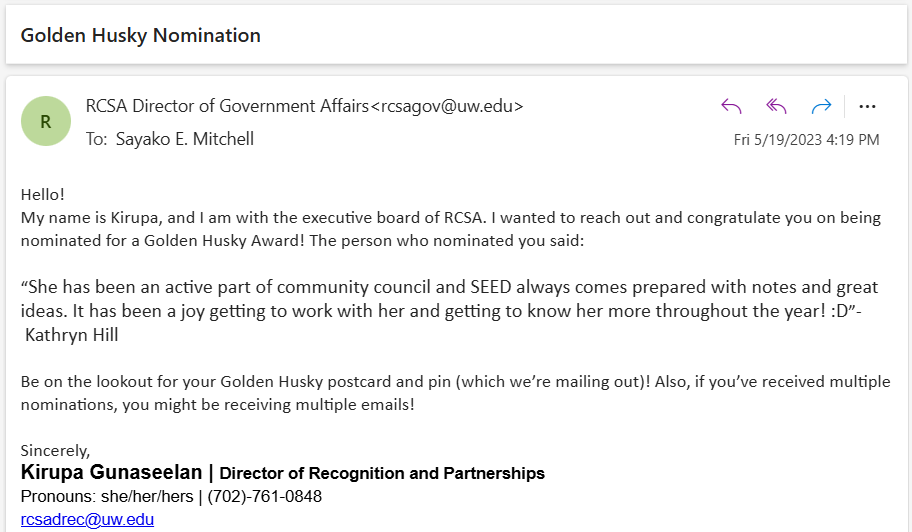
By my sophomore year, I knew something needed to change. I had gotten a room in an apartment in Stevens Court, and I was determined to get involved this year. The opportunity to do so came along in the form of a flyer tacked to my front door, advertising open positions for the Stevens Court Community Council. Even as I drafted my application, I wasn't sure that this would be the right fit for me. I'd never done anything like it–in fact, I had intentionally avoided student leadership positions in the past. I was too afraid that I would be unqualified and that I would somehow mess everything up. These worries were made worse by the pressure of working in a team of people I didn't know. But once I was accepted onto the Community Council and began working with the other Council members, I started to see that my anxieties were completely overblown. Everyone that I worked with was understanding, and when I admitted that I had never held a leadership position before, they were quick to reassure me. Over the course of that year, we each had some missteps, but when issues cropped up we talked through them together. It was far from the high-pressure, confrontational environment that I had feared. At the end of the year, my Assistant Resident Director nominated me for a Golden Husky Award. In her nomination, she mentioned that she appreciated how I always came to meetings prepared. This was something that I had never acknowledged about myself, but once it was pointed out, I realized that I do put a lot of effort into being organized and ready before each meeting. Although I joined the Community Council out of a desire to make more connections, I found that my biggest takeaway from this experience was actually an increased sense of self confidence. As others began trusting me with more responsibilities, I began to trust myself more as well. When others appreciated my contributions, I started being able to recognize and take pride in my own achievements, something that I had always struggled to do in the past.  Working in the Libraries (AU23)
Working in the Libraries (AU23)  I began working at the Tateuchi East Asia Library in the spring quarter of my freshman year. I was hired as a Circulation Student Assistant, a job that originally included the responsibility of staffing the information desk and assisting users. However, due to scheduled renovations, the library closed to the public not even two weeks after I began working there. For my entire sophomore year, my job consisted largely of working alone in the empty library, quietly churning through the routine tasks that keep a library running–scanning in returned books, sending out requested items, reshelving cart after cart of materials. During these months, I quite enjoyed this work and the little break it gave me from the rest of the world.
I began working at the Tateuchi East Asia Library in the spring quarter of my freshman year. I was hired as a Circulation Student Assistant, a job that originally included the responsibility of staffing the information desk and assisting users. However, due to scheduled renovations, the library closed to the public not even two weeks after I began working there. For my entire sophomore year, my job consisted largely of working alone in the empty library, quietly churning through the routine tasks that keep a library running–scanning in returned books, sending out requested items, reshelving cart after cart of materials. During these months, I quite enjoyed this work and the little break it gave me from the rest of the world.
But of course, it couldn't last. When I came back to my job after summer break, I found that not only had the library fully reopened, but it had grown to be a popular study spot. I was now responsible for assisting all of these new patrons, whether that was by helping them locate materials, giving them directions, or troubleshooting the printer when it began acting up. To my unending horror, I even had to answer the phone. It felt like I had been thrust into an entirely new job. It may sound silly, but as a lifelong introvert with severely limited customer service experience, this change was overwhelming, and became a major source of anxiety for me. I briefly contemplated finding another job, but I hated the idea of quitting. By then, I had spent so many hours in the library that it had begun to feel like my home base on campus. Moreover, I still enjoyed every part of the job that wasn't interacting with patrons–I got along with my coworkers, I liked the cramped stacks, and I loved the beautiful, newly renovated reading room. Having resolved to stay, I did the only thing that I could do–I grit my teeth and practiced. I rehearsed my opening line for the phone, I memorized the directions that people asked for the most often, and I made sure to smile when I greeted patrons, even as I cringed at myself for stumbling over my words. Eventually, it got easier. I got used to this new dimension of my job, and by now all of these tasks are second nature to me (Seriously, I could give directions to the nearest bathrooms in my sleep). While I have undoubtedly done greater things in my life than learning how to answer a phone without stuttering, I am still proud of myself for rising to this particular challenge, especially since it required me to overcome an anxiety that I had struggled with for years.  Study Abroad: Thinking Critically about Libraries (SU23)
Study Abroad: Thinking Critically about Libraries (SU23)As part of the program, each of us was required to write a post on the official program blog. I chose to write mine on the relationship between colonialism and libraries, and how some Dutch libraries were working towards decolonization. This got me thinking about what I could do to improve the libraries that I work in. My role in the library system is small, and truthfully there isn't much I can do to affect large-scale change. But I know I'm still able to have some influence, limited as it may be. Engaging with this program and learning to look critically at libraries has encouraged me to have conversations about bias with my coworkers. My hope is that I'm able to get more people to think critically about the role of libraries. More broadly, this program taught me to be critical about the things that I like. Just because something seems good to me doesn't mean that they're good for everyone.  More Study Abroad! (SU23)
More Study Abroad! (SU23)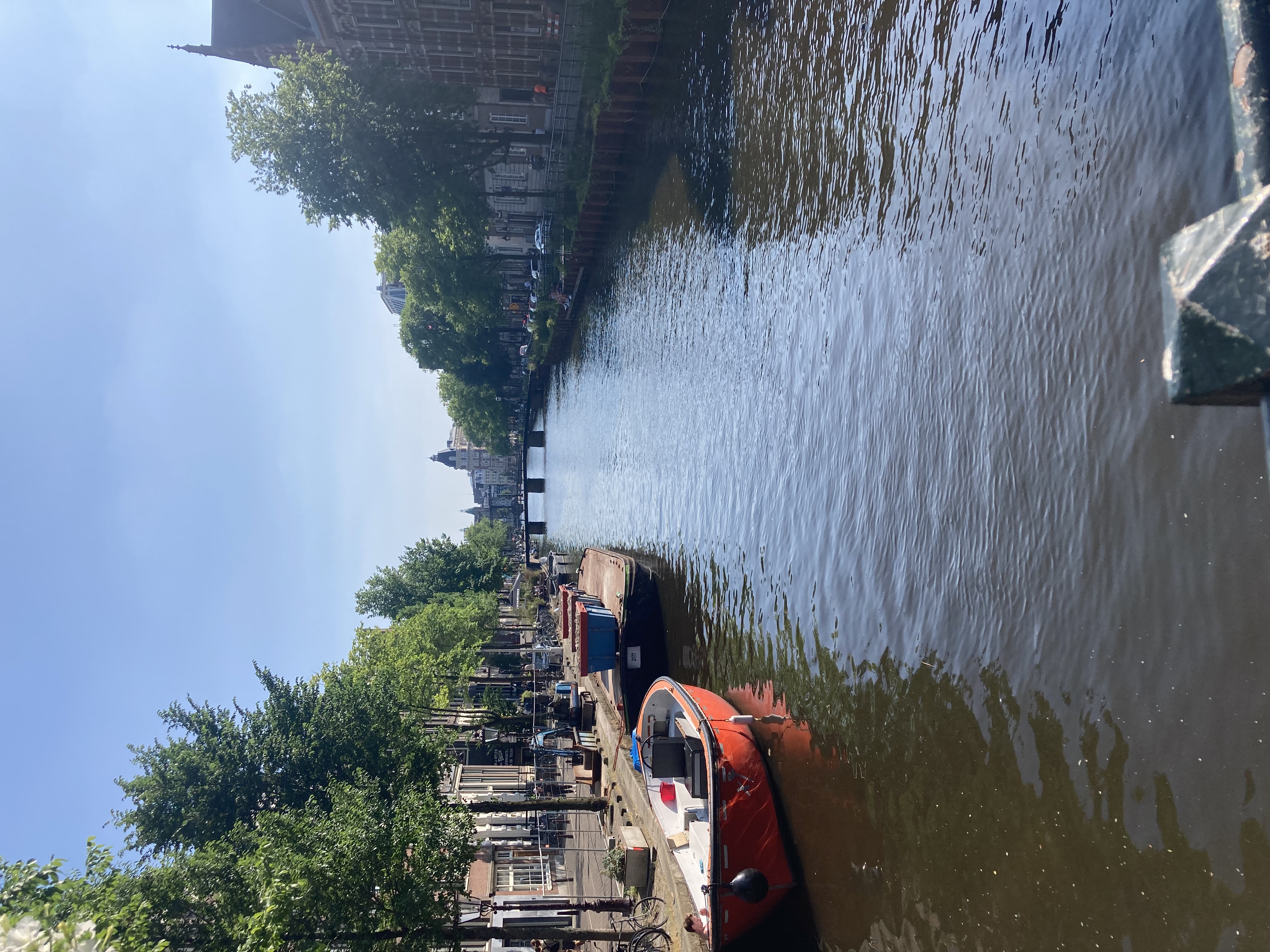
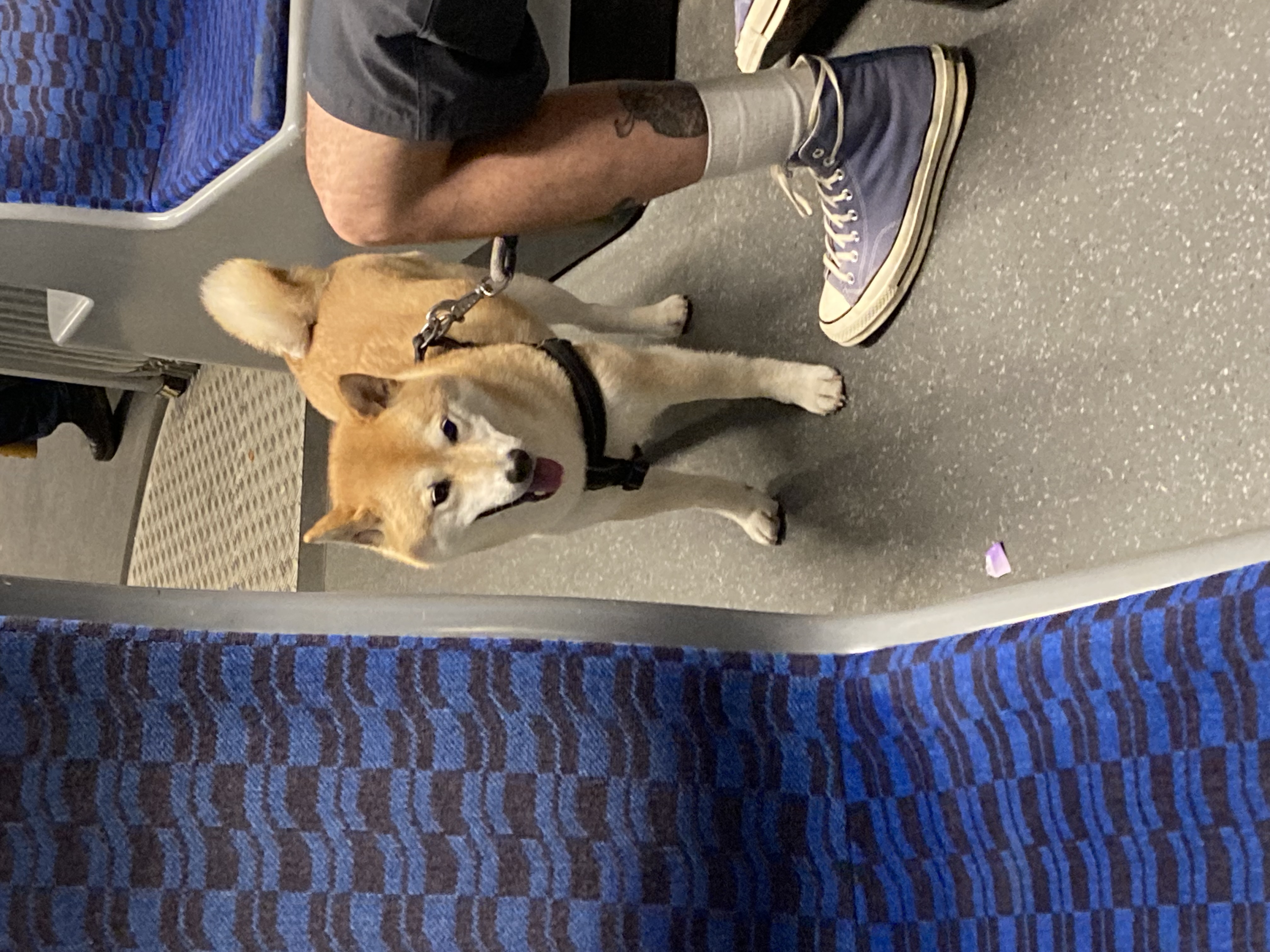
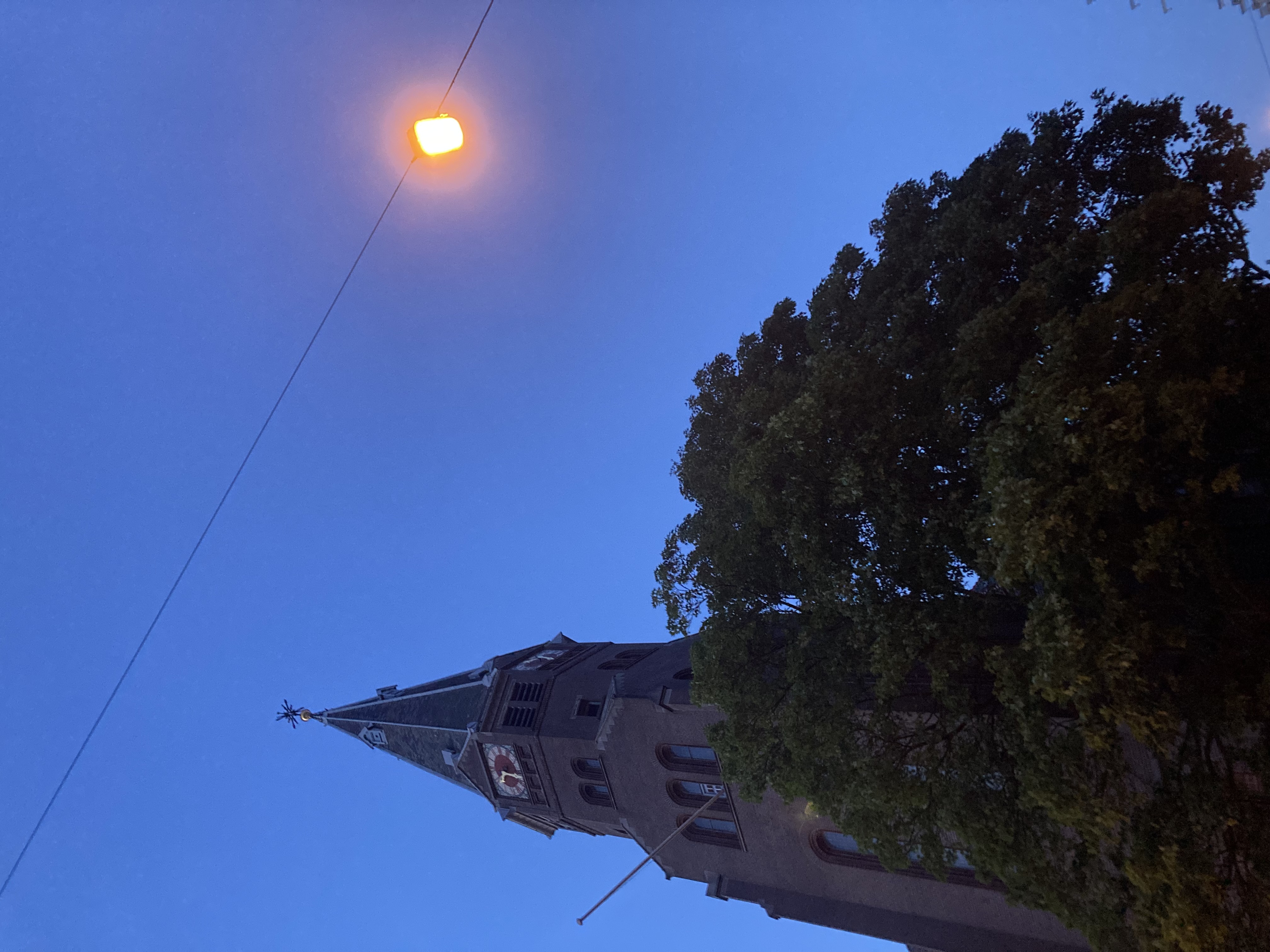 To say that I was nervous before departing for my study abroad program is a massive understatement. I had never been to Europe before, nor had I ever traveled alone. Stepping off the plane, I felt nearly sick with anxiety, wondering how I had ever thought it would be a good idea to go to a place where I didn't know who anyone was, where anything was located, or how I was supposed to behave. I was irrationally afraid of making some awful faux pas and upsetting someone. And to be candid, I'm sure I made plenty of mistakes, especially in my first few days–one that comes to mind is when I sat at a table in a restaurant for 45 minutes waiting for my check, not knowing that it was custom to ask for it–but by and large everyone I met was patient with me, no doubt used to clueless Americans.
To say that I was nervous before departing for my study abroad program is a massive understatement. I had never been to Europe before, nor had I ever traveled alone. Stepping off the plane, I felt nearly sick with anxiety, wondering how I had ever thought it would be a good idea to go to a place where I didn't know who anyone was, where anything was located, or how I was supposed to behave. I was irrationally afraid of making some awful faux pas and upsetting someone. And to be candid, I'm sure I made plenty of mistakes, especially in my first few days–one that comes to mind is when I sat at a table in a restaurant for 45 minutes waiting for my check, not knowing that it was custom to ask for it–but by and large everyone I met was patient with me, no doubt used to clueless Americans.
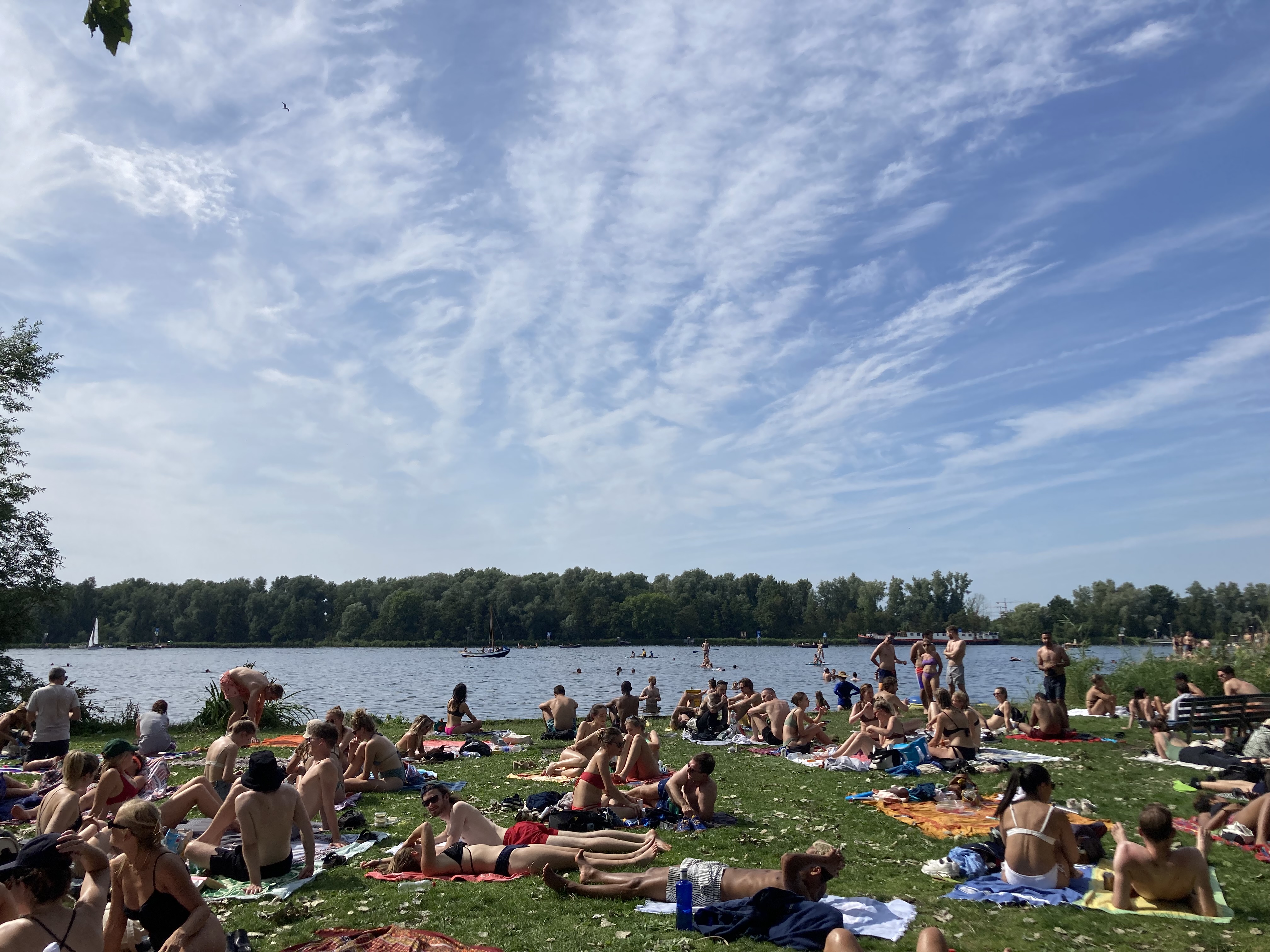
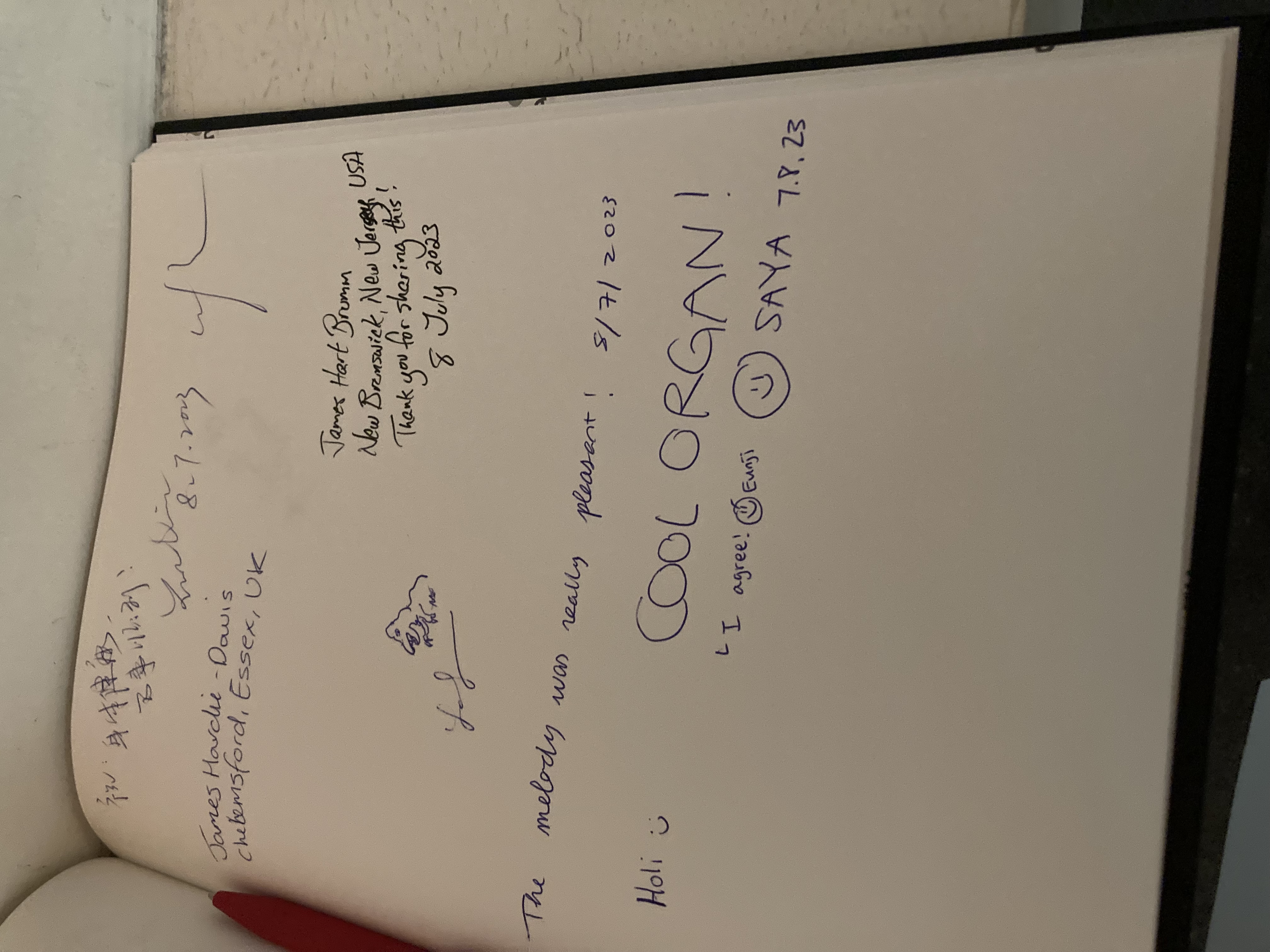
After a week or so of not getting yelled at by the Dutch, I began to feel like I was getting my footing. I started feeling confident moving through the neighborhood surrounding our hotel. Eventually, I began venturing beyond the immediate vicinity, using the tram or the metro. I even gave biking a try, although I decided that would be best left to the locals after I nearly toppled off my bike in the middle of the street. This program was the furthest I'd been pushed outside of my comfort zone while at UW, and it's the experience that forced me to grow the most. I returned to Seattle with a new sense of confidence and the knowledge that, generally speaking, I am capable of solving any problem that might come my way.  Job Offer in Wisconsin! (WI25)
Job Offer in Wisconsin! (WI25)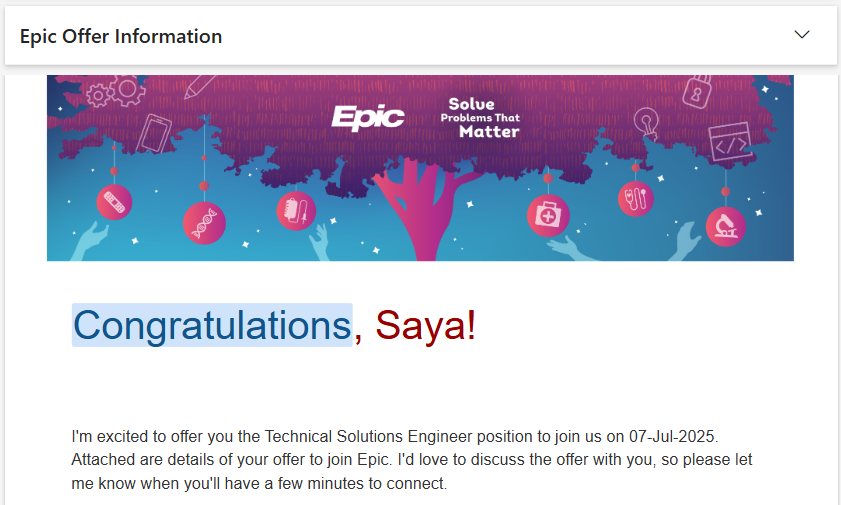
These thoughts led me to apply for a job working at Epic, a healthcare software company headquartered in Wisconsin. Working there would mean moving to Madison, a city nearly 2000 miles away. Considering I have never even visited the midwest, this is a daunting prospect. However, I also find myself excited by the idea of exploring a new place with a new culture. I know from my study abroad experience that putting myself in that situation would lead me to discover new facets of myself, ones that I might never find if I stay in Seattle. I want to maximize my opportunities for personal growth in this next stage of my life, and I believe that moving to a new place could help me achieve that. To people that knew me before UW, the fact that I'm even considering moving outside of western Washington is probably a surprise. I have come a long way from the anxious high school senior who couldn't even stomach the idea of going to school on the other side of the Cascades, let alone several states away. I underwent the interview process for Epic over this past quarter, and got an offer just two weeks ago. I will be visiting Madison and the Epic campus at the beginning of April to see what the area is like. I won't lie, the prospect of moving still makes me quite anxious. However, the past four years have taught me that anxiety is not something that needs to be avoided at all costs. It's merely a natural reaction to pushing my boundaries–a process necessary for growth. 
|
|
|
